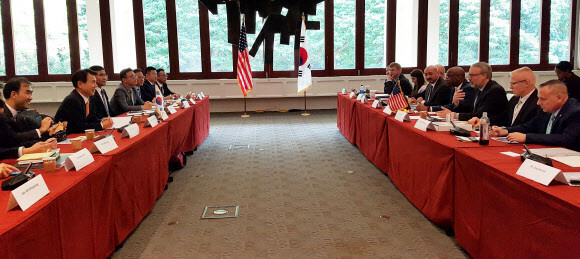Posted on : Oct.31,2019 17:13 KST
 |
|
The second round of negotiations for the 11th special measures agreement (SMA) between South Korea and the US in Honolulu, Hawaii, on Oct. 23. (provided by the Ministry of Foreign Affairs)
|
Strategic value of Korean Peninsula necessitates US troops presence
 |
|
The second round of negotiations for the 11th special measures agreement (SMA) between South Korea and the US in Honolulu, Hawaii, on Oct. 23. (provided by the Ministry of Foreign Affairs)
|
Former Ministers of Defense and South Korea-US Combined Forces Command (CFC) commanders voiced skepticism in response to speculation from some quarters that US Forces Korea may reduce or withdraw its troops after wartime operational control (OPCON) is returned to the South Korean military. In an interview in Volume 3 of the “Korean-American Journal” published by the Korean-American Club (chaired by Lee Kang-duk), they predicted the OPCON transfer would not lead to any sudden withdrawal of USFK troops, citing the strategic value of the Korean Peninsula.
“While the OPCON transfer will not lead immediately to a USFK withdrawal or sudden weakening of the South Korea-US alliance, there is a risk,” said former Minister of National Defense Kim Dong-shin.
“If only to allay these concerns, there need to be ongoing efforts from South Korea and the US to strengthen the Security Consultative Meeting (SCM) and Military Committee Meeting (MCM) system for implementing the policies of their military command organizations,” he suggested.
Yoon Kwang-ung, another former defense minister, predicted, “There won’t be any sudden withdrawal of USFK as long as the value of the Korean Peninsula in terms of the US’ global strategy is maintained.”
“I agree with General [Douglas] MacArthur and US strategist Harry Summers’ argument about a single major power emerging on the Eurasian continent, and if we understand that power to be China, then I think USFK will have a necessary role in terms of US global strategy,” he said.
In terms of the timeline for the OPCON transfer, the interviewees said the decision should be based on the South Korean military’s conditions and capabilities rather than political concerns.
“The OPCON transfer just needs to happen at a time when the specific conditions are fully met, including the establishment of response capabilities to the North Korean nuclear missile threat as agreed upon by South Korea and the US,” Kim said.
“The priority needs to be on efforts by both South Korea and the US to satisfy those conditions,” he added.
Importance of not letting politics interferer with military judgement
Han Min-goo, another former defense minister, said, “In logical terms, you could argue that an OPCON transfer would be possible during the Moon Jae-in administration’s term once the needs and adequate conditions are satisfied. Objectively, however, it’s a matter that requires accurate assessment and a careful judgment.”
“The OPCON transfer is directly tied to national security, and political aims should under no circumstances be allowed to distort the rationality in policy terms or the military determination,” he stressed.
Yun noted, “While there may be some politicized outcry from conservatives, I think that with a political and diplomatic determination from the current administration, we could have an OPCON transfer based on the efforts made over the past 30 years.”
“That would also require an agreement between South Korea and the US on continuing the alliance, maintaining a certain level of US forces, and supplementing the functions of the UN Command,” he added.
Two former CFC commanders, Gens. James Thurman and Vincent Brooks, also stressed the importance of “meeting conditions” regarding the OPCON transfer schedule in interviews published in the journal.
When asked whether he thought a transfer would be possible before the end of Moon Jae-in’s term in office in May 2022, Thurman replied, “It needs to be based on the conditions. It’s about possessing the right capabilities for commanding and controlling the Combined Forces.” Regarding the possibility of USFK troops being reduced or withdrawn after the transfer, he said, “As long as there are serious threats from North Korea, including the threats of nuclear weapons and long-range missiles, the US will need to station them to provide a reliable deterrent.”
Target timing for OPCON transfer May 2022
Brooks said an OPCON transfer by May 2022 would “be possible once the conditions are suitably met in terms of the South Korean military’s command and control capabilities, the readiness posture within the decision makers’ combined policy decision system, and selected military capabilities.”
“Once the OPCON transfer happens, there will be people on both the South Korean and US side pressing for USFK reductions,” he predicted.
“The debate over the future roles of the US and South Korean armed forces on the Korean Peninsula needs to take place independently from the OPCON transfer,” he stressed. “It should be based on an accurate assessment of the security situation.”
By Yoo Kang-moon, senior staff writer
Please direct comments or questions to [english@hani.co.kr]










